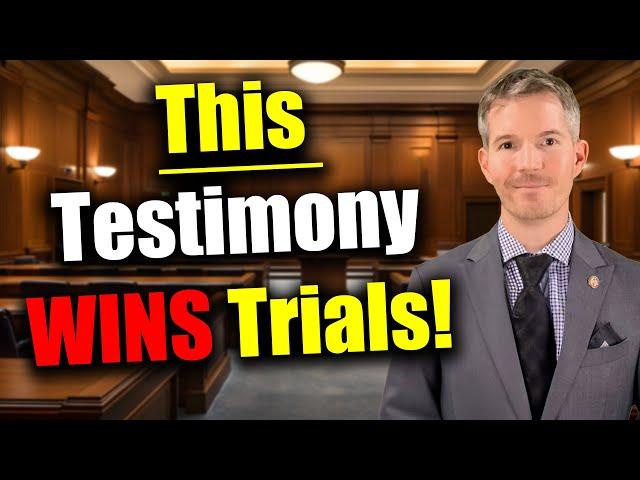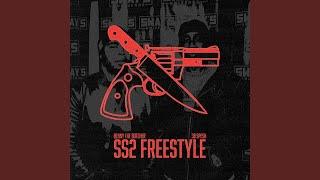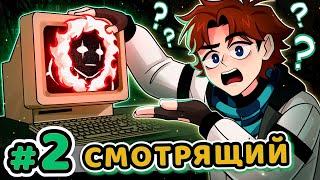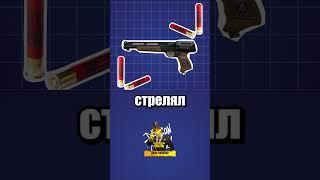
How to testify in Court. 3-step process to Testify to WIN in Trial.
Are you concerned about your testimony for the Court Date coming up? I’m going to share a couple of tips I’ve learned over the years that will help you give the type of testimony that wins trials. If you want to know how to answer questions in court, we have your answers.
Chapters:
00:00 – Intro
00:16 – Listen to the Question
01:07 – Understand the Question
02:06 – Answer the Question
02:49 – The Seven Deadly Questions
04:41 – Three Steps
05:02 – Some other tips and tricks
Also find our content on:
Facebook.com/MatthewHarrisLaw
Instagram - @Matthew_Harris_Law
Google Maps – https://g.page/MatthewHarrisLaw
Website - https://matthewharrislaw.com/
ORIGINAL BLOG: https://matthewharrislaw.com/testifying-to-win-in-court/
LISTEN TO THE QUESTION
This may seem obvious but is the most commonly ignored piece of advice. When the attorney begins asking a question, many witnesses think they understand the question before it is finished. Then, the witness answers a question that isn’t even finished yet.
Obviously, when the question isn’t yet finished, then it is impossible to accurately answer the question. For example, if asked, “Didn’t you sign this contract…” and you answer “Yes!” before the rest of the question “…to commit fraud?” can you see how that may create a problem for you?
When you’re testifying, don’t be afraid to SLOW DOWN. Let the attorney fully finish the question, then repeat the question back to yourself inside of your head. This will ensure that you’re listening to the entire question.
This will also help to ensure that you understand the question before giving your answer.
UNDERSTAND THE QUESTION
Attorneys are highly education professionals. Unfortunately, this education sometimes disconnects them from their own clients. Sometimes attorneys are too educated for their own good.
Attorneys spend approximately 7 years in school before they can take the Bar Exam. Through all these years of education, they learn a lot of big words. These complicated and fancy sounding words often hurts them in Court. They may not mean to do it, but at some point during your testimony, the attorney is going to use a weird word, and you’ll have no idea what it means. Mark Twain said it best, “Don’t use a five-dollar word when a fifty-cent word will do.”
For example, if asked “At what point did you direct aspersions to my client?” but you have no idea what aspersions are, then DON’T answer the question! Don’t be afraid to ask the attorney to clarify, or to tell the attorney that you do not understand what the word means.
Before you can answer the question, you need to understand the question.
ANSWER THE QUESTION
Again, this seems obvious, but if you don’t answer the question that is actually being asked, then one of the attorneys will object. Your own attorney may even object to your testimony. I have actually objected to my own client’s answer to one of my questions. If you hear, “Objection, Nonresponsive” then that means the attorney thinks you didn’t answer the question.
For example, if asked, “Did you see Mr. Defendant stop at the red light?” and you answer “Well, it was really hard to see from where I was standing.” then you didn’t actually answer the question that was asked of you. The answer here is a simple “Yes” or “No.” Did you see Mr. Defendant stop, or did you not?
THE 7 DEADLY QUESTIONS
Ok, these questions aren’t actually deadly, but they are the most common questions that you will be asked. Listen for these questions and be prepared to answer them correctly.
Who? – If asked “Who was with you…” then your answer should provide the person’s name.
What? – If asked “What is your favorite color?” then your answer should provide your favorite color.
When? – If asked “When did you…” then your answer should provide a date and/or a time of day.
Where? – If asked “Where did you…” then your answer should provide a location.
Why? – If asked “Why did you…” then your answer should provide the reason that you took the action.
How? – If asked “How did you…” then your answer should provide the manner in which you took the action.
Yes/No – If asked a question where the answer is clearly Yes or No, then your answer should clearly be Yes or No.
Yes/No questions are the most difficult to answer because the answer isn’t always quite so black or white. Most answers end up being some varying shade of gray in between. If the answer is mostly yes, or mostly no, then your answer can provide a short clarification as to why you can’t simply respond with Yes or No.
For example, if asked, “Isn’t it true that you ate my client’s cupcake without his permission?” The truth is that you ate a cupcake that you thought was yours, but then later found out that it was someone else’s. In that s...
Music:
North Oakland Extasy – Squadda B
Music provided via YouTube Studio Audio Library
how to testify in court effectively
testifying in court
custody hearing
how to answer questions in court
testifying in court effectively
Chapters:
00:00 – Intro
00:16 – Listen to the Question
01:07 – Understand the Question
02:06 – Answer the Question
02:49 – The Seven Deadly Questions
04:41 – Three Steps
05:02 – Some other tips and tricks
Also find our content on:
Facebook.com/MatthewHarrisLaw
Instagram - @Matthew_Harris_Law
Google Maps – https://g.page/MatthewHarrisLaw
Website - https://matthewharrislaw.com/
ORIGINAL BLOG: https://matthewharrislaw.com/testifying-to-win-in-court/
LISTEN TO THE QUESTION
This may seem obvious but is the most commonly ignored piece of advice. When the attorney begins asking a question, many witnesses think they understand the question before it is finished. Then, the witness answers a question that isn’t even finished yet.
Obviously, when the question isn’t yet finished, then it is impossible to accurately answer the question. For example, if asked, “Didn’t you sign this contract…” and you answer “Yes!” before the rest of the question “…to commit fraud?” can you see how that may create a problem for you?
When you’re testifying, don’t be afraid to SLOW DOWN. Let the attorney fully finish the question, then repeat the question back to yourself inside of your head. This will ensure that you’re listening to the entire question.
This will also help to ensure that you understand the question before giving your answer.
UNDERSTAND THE QUESTION
Attorneys are highly education professionals. Unfortunately, this education sometimes disconnects them from their own clients. Sometimes attorneys are too educated for their own good.
Attorneys spend approximately 7 years in school before they can take the Bar Exam. Through all these years of education, they learn a lot of big words. These complicated and fancy sounding words often hurts them in Court. They may not mean to do it, but at some point during your testimony, the attorney is going to use a weird word, and you’ll have no idea what it means. Mark Twain said it best, “Don’t use a five-dollar word when a fifty-cent word will do.”
For example, if asked “At what point did you direct aspersions to my client?” but you have no idea what aspersions are, then DON’T answer the question! Don’t be afraid to ask the attorney to clarify, or to tell the attorney that you do not understand what the word means.
Before you can answer the question, you need to understand the question.
ANSWER THE QUESTION
Again, this seems obvious, but if you don’t answer the question that is actually being asked, then one of the attorneys will object. Your own attorney may even object to your testimony. I have actually objected to my own client’s answer to one of my questions. If you hear, “Objection, Nonresponsive” then that means the attorney thinks you didn’t answer the question.
For example, if asked, “Did you see Mr. Defendant stop at the red light?” and you answer “Well, it was really hard to see from where I was standing.” then you didn’t actually answer the question that was asked of you. The answer here is a simple “Yes” or “No.” Did you see Mr. Defendant stop, or did you not?
THE 7 DEADLY QUESTIONS
Ok, these questions aren’t actually deadly, but they are the most common questions that you will be asked. Listen for these questions and be prepared to answer them correctly.
Who? – If asked “Who was with you…” then your answer should provide the person’s name.
What? – If asked “What is your favorite color?” then your answer should provide your favorite color.
When? – If asked “When did you…” then your answer should provide a date and/or a time of day.
Where? – If asked “Where did you…” then your answer should provide a location.
Why? – If asked “Why did you…” then your answer should provide the reason that you took the action.
How? – If asked “How did you…” then your answer should provide the manner in which you took the action.
Yes/No – If asked a question where the answer is clearly Yes or No, then your answer should clearly be Yes or No.
Yes/No questions are the most difficult to answer because the answer isn’t always quite so black or white. Most answers end up being some varying shade of gray in between. If the answer is mostly yes, or mostly no, then your answer can provide a short clarification as to why you can’t simply respond with Yes or No.
For example, if asked, “Isn’t it true that you ate my client’s cupcake without his permission?” The truth is that you ate a cupcake that you thought was yours, but then later found out that it was someone else’s. In that s...
Music:
North Oakland Extasy – Squadda B
Music provided via YouTube Studio Audio Library
how to testify in court effectively
testifying in court
custody hearing
how to answer questions in court
testifying in court effectively
Тэги:
#attorney #divorce_lawyer #texas_lawyer #testify #how_to_testify_in_court_effectively #court #law #how_to_win_in_court #direct_examination #crossexamination #cross_examination #testify_to_judge #divorce_testimony #custody_testimony #child_custody #child_support_testimony #parental_alienation #parental_alienation_testimony #testify_to_win #court_cam #win_in_trial #trial #court_testimony #court_testimony_example #court_testimony_procedure #how_to_testify #how_to_testify_in_courtКомментарии:
How to testify in Court. 3-step process to Testify to WIN in Trial.
Matthew Harris Law, PLLC
Огненная дуга. Прорыв Рокоссовского (д\ф, 2017)
Документальные фильмы Андрея Егорова
FRANKLIN BIKE JUMP FROM HIGEST BUILDING #shorts #monsterrxgaming
MONSTERRX GAMING
️️ The Yellow Claw ️️ | Classic Detective Mystery by Sax Rohmer
Classic Detective Mysteries
Beast/B2ST beautiful ️️
Bella NSH Lavender Dream
SS2 Freestyle
Benny the Butcher
ВРАГ ВНУТРИ ТЕБЯ || Геннадий Фомин | Христианские проповеди АСД
Замоскворецкая община


























